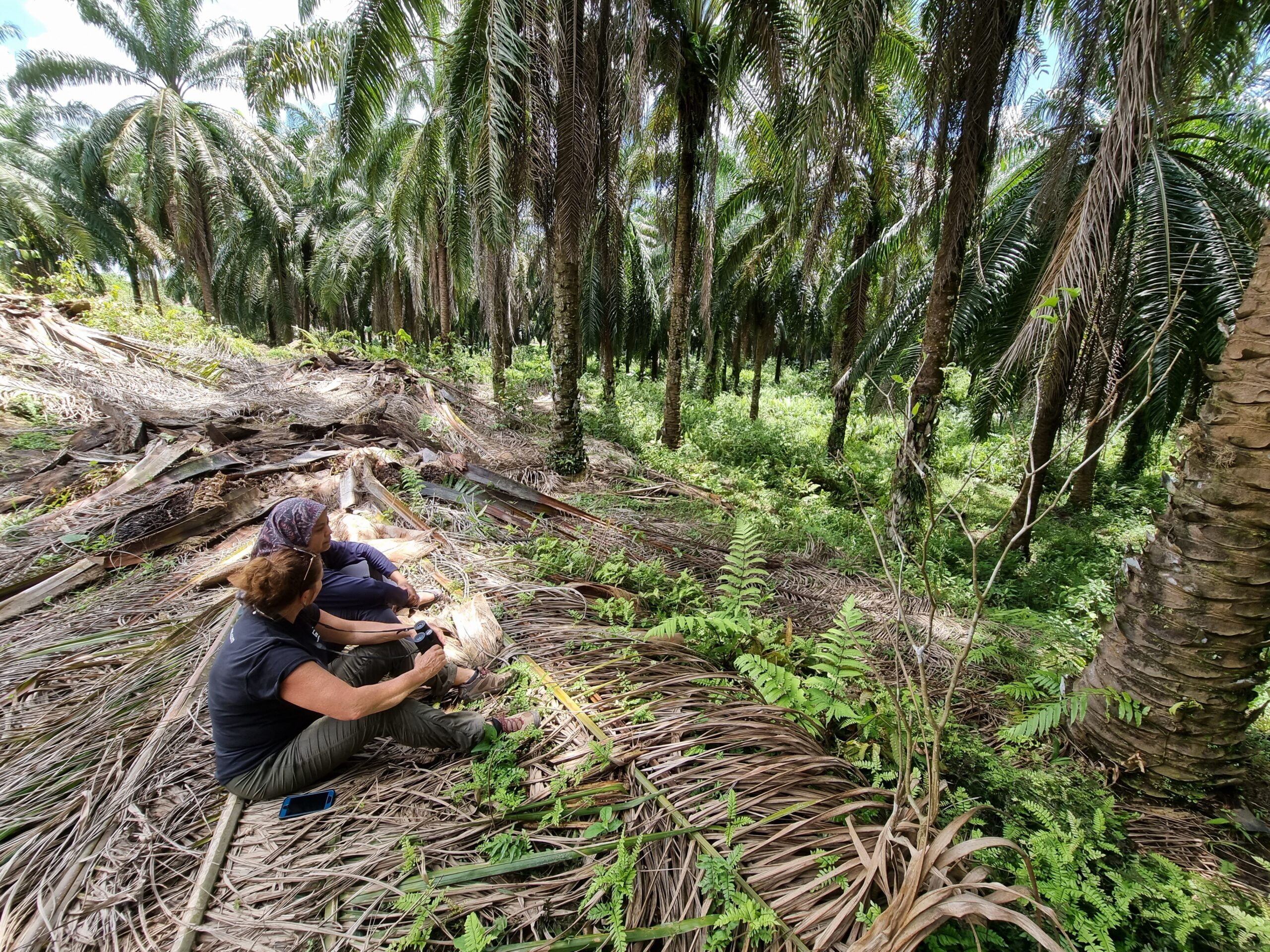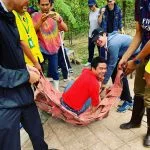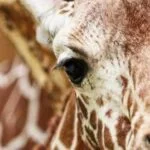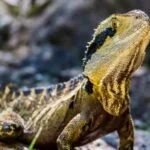Elephant Welfare – The Palm Oil Problem
After two years, the Wild Welfare team were finally able to return to in-person, hands-on international projects with a visit to Sabah, Malaysia. The trip emphasized elephant welfare, which included taking a close look at the behaviour and welfare of wild elephants which often range into oil palm plantations. In order to deepen our understanding of oil palm plantation operations and the implications to wild elephants, we spent 3 days visiting a plantation.
Whilst the majority of Wild Welfare’s projects concentrate on the welfare of animals in captive facilities such as zoos, aquariums and sanctuaries, the charity is equally enthusiastic about compassionate conservation. With increasing human-animal interaction and the resulting conflict, it’s imperative to examine the impact of mitigation techniques upon the welfare of wild animals.
The presence of wild elephants in oil palm plantations is common but due to their natural foraging behaviours,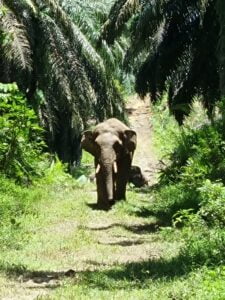 sociality, size, and ability to alter the landscape, they are perceived to have a negative influence on the palm growing business; therefore their company is rarely tolerated. As a result, human/elephant conflict mitigation solutions commonly involve the use of highly aversive techniques such as chasing elephants off plantation property with firecrackers, heavy equipment, and poisoning.
sociality, size, and ability to alter the landscape, they are perceived to have a negative influence on the palm growing business; therefore their company is rarely tolerated. As a result, human/elephant conflict mitigation solutions commonly involve the use of highly aversive techniques such as chasing elephants off plantation property with firecrackers, heavy equipment, and poisoning.
Aversive techniques are designed to rapidly and aggressively drive elephants away from human interests. The herd may react quickly to escape the frightening experience that results when these techniques are used, and with their rapid exit from the area, calves may be inadvertently left behind as orphans. Attempts are made to reunite these orphans with their families, but are often unsuccessful, leaving captivity as the only option for the calves. Therefore, our project, which aims to reduce human-elephant conflict, will protect individual elephant welfare by minimizing the use of these aversive techniques and promote Bornean elephant conservation initiatives by keeping more elephants in the wild environment.
In partnership with Seratu Aatai, Wild Welfare’s Field Director Dave Morgan, and Margaret Whittaker from Creative Animal Behaviour Solutions visited a plantation in Sabah to spend time observing the behaviour of six wild bull elephants who have chosen to reside on this plantation’s property. Going forward, the objective will be to study the elephants’ behaviour as an aid in the development of a conflict mitigation plan to safeguard human interests while protecting elephants.
Based on preliminary discussions with plantation managers, the primary sources of conflict revolve around the elephants’ pursuit of young palm trees for food, and damage to water storage tanks. Young palm trees are particularly vulnerable to elephants because the elephants may easily access the delicate growth in the centre of the tree resulting in immediate death of the tree. Elephants have been known to wipe out over 200 trees in a single night. The water storage tanks are damaged by thirsty elephants when they use their tusks or other objects to punch holes in the tanks to access fresh water.
In collaboration with the oil palm plantation management, the team will explore options that rely on compassionate conflict mitigation approaches, whilst minimizing the use of traditional, aversive methods, and thus prioritizing the welfare of the elephants. Redirecting the elephant’s attention from the attractants to sustainable alternatives (e.g. elephant specific water sources) can help reduce losses to the oil palm business, whilst allowing the elephants to reside in the plantation more safely.
Palm oil is a substance relied on by humans and is the most heavily consumed vegetable oil on earth. It’s found in products ranging from food to cosmetics and bio-diesel. Due to its high growth yield for equivalent land mass usage, a total boycott of the substance is not viable, therefore supporting sustainable palm oil systems is the best course of action.
This is a new and very exciting field for Wild Welfare. When one considers animal welfare, one usually only thinks in terms of animals in captivity. Quite often the welfare and wellbeing of free-ranging animals in the wild are not given any consideration. This project gives us the opportunity to take a bit more of a holistic approach to all elephants in Sabah, both captive and wild. Dave Morgan, Field Director.
Sabah, as a state, has designated over 50% of its land mass to protected areas of forest but there are significant regions dedicated to palm oil businesses. The single, mid-sized plantation visited by the Wild Welfare team is adjacent to a fragmented yet protected area of 36,000 hectares which is home to an estimated 250 wild elephants. Due to the size and fragmentation of this protected area, it is not sufficient to support this population size, and therefore plantation lands are essential to the survival of the elephants. Due to the fragmentation of the protected areas, wildlife corridors which connect the fragmented segments of forest allow animals to use more land by safely moving between protected areas, or find their way out of plantations and other human inhabited areas. Developing more such passageways through palm oil estates would serve to link protected areas and provide safe travel zones for elephants and other animals, thus reducing conflict with humans.
Wild Welfare is keen to support and collaborate with plantation owners to develop compassionate conservation and welfare practices. We are excited to have an oil palm plantation partner to aid in the design, development and implementation of conflict mitigation strategies that can be shared with smaller plantations who suffer proportionally greater losses from elephants compared to the larger plantations. To further advance this ongoing project, we aim to work collaboratively with plantations to undertake behavioural studies on the elephants including food preference studies, understanding their motivations and movement patterns, and use this information as we pioneer humane techniques to redirect the elephants away from human interests.
~ENDS~
Notes to Editors
For more information or interview requests please contact Wild Welfare on communications@wildwelfare.org
Wild Welfare is a global organisation committed to improving animal welfare for captive wild animals. By uniting the world’s leading zoos, zoo associations and animal welfare organisations, we build trusting partnerships that help provide long-term solutions to critical wild animal welfare issues.
Our vision is to end the suffering of captive wild animals around the world and ensure full and sustainable protection is given to all animals in human care. Find out more at wildwelfare.org. Registered charity in England (no.1165941).

